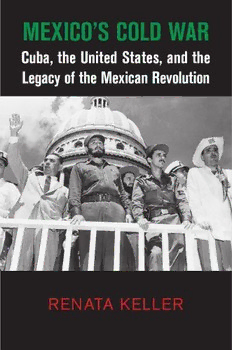
Mexico’s Cold War: Cuba, The United States, And The Legacy Of The Mexican Revolution PDF
Preview Mexico’s Cold War: Cuba, The United States, And The Legacy Of The Mexican Revolution
MEXICO’S COLD WAR Cuba, the United States, and the Legacy of the Mexican Revolution RENATA KELLER Mexico’s Cold War Mexico’s Cold War examines the history of the Cold War in Mexico and Mexico in the Cold War. Renata Keller draws on declassified Mexican and US intelligence sources and Cuban diplomatic records to challenge earlier interpretations that depicted Mexico as a peaceful haven and a weak neighbor forced to submit to US pressure. Mexico did in fact suf- fer from the political and social turbulence that characterized the Cold War era in general, and by maintaining relations with Cuba it played a unique, and heretofore overlooked, role in the hemispheric Cold War. The Cuban Revolution was an especially destabilizing force in Mexico because Fidel Castro’s dedication to many of the same nationalist and populist causes that the Mexican revolutionaries had originally pur- sued in the early twentieth century called attention to the fact that the government had abandoned those promises. A dynamic combination of domestic and international pressures thus initiated Mexico’s Cold War and shaped its distinct evolution and outcomes. Renata Keller is an Assistant Professor of International Relations in the Frederick S. Pardee School of Global Studies at Boston University. Cambridge Studies in US Foreign Relations Edited by Paul Thomas Chamberlin, University of Kentucky Lien-Hang T. Nguyen, University of Kentucky This series showcases cutting-edge scholarship in US foreign relations that employs dynamic new methodological approaches and archives from the colonial era to the present. The series will be guided by the ethos of transnationalism, focusing on the history of American foreign relations in a global context rather than privileging the United States as the dominant actor on the world stage. Mexico’s Cold War Cuba, the United States, and the Legacy of the Mexican Revolution RENATA KELLER Boston University 32 Avenue of the Americas, New York, NY 10013-2473, USA Cambridge University Press is part of the University of Cambridge. It furthers the University’s mission by disseminating knowledge in the pursuit of education, learning, and research at the highest international levels of excellence. www.cambridge.org Information on this title: www.cambridge.org/9781107079588 © Renata Keller 2015 This publication is in copyright. Subject to statutory exception and to the provisions of relevant collective licensing agreements, no reproduction of any part may take place without the written permission of Cambridge University Press. First published 2015 Printed in the United States of America A catalog record for this publication is available from the British Library. Library of Congress Cataloging in Publication Data Keller, Renata, 1981– Mexico’s Cold War : Cuba, the United States, and the legacy of the Mexican Revolution / Renata Keller. pages cm. – (Cambridge studies in US foreign relations) Includes bibliographical references and index. ISBN 978-1-107-07958-8 (hardback) 1. Mexico – Foreign relations – 1946–1970. 2. Mexico – Foreign relations – 1970–1988. 3. Cold War. 4. Mexico – Foreign relations – United States. 5. United States – Foreign relations – Mexico. 6. Mexico – Foreign relations – Cuba. 7. Cuba – Foreign relations – Mexico. I. Title. F1228.K45 2015 327.72073–dc23 2015009550 ISBN 978-1-107-07958-8 Hardback Cambridge University Press has no responsibility for the persistence or accuracy of URLs for external or third-party Internet Web sites referred to in this publication and does not guarantee that any content on such Web sites is, or will remain, accurate or appropriate. I dedicate this book to my parents.
